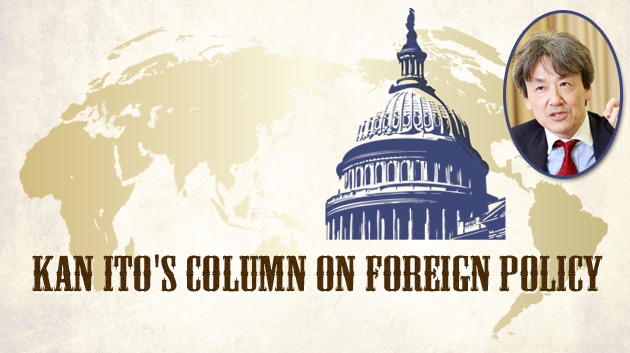Will the U.S. Withdraw from East Asia After Obama’s Reelection?
Kan Ito's Column on Foreign Policy

Kan Ito
Kan Ito is an international political analyst. Born in 1953. Graduated from Tokyo University’s Faculty of Economics. Studied American Political History and International Relations at Cornell University. Started his career working as a business consultant where he analyzed international politics and financial markets. His books include “Japan Will Surrender to China’s Nuclear War Potential” (Shogakukan Inc.), and “The Self Destruction of the American Empire” (Bunshun Shinsho).
Q:The American public elected President Obama for a second term in office. How is U.S. foreign diplomacy going to change?
A:On the surface, it looks like there will be no significant changes. The U.S. is going to continue to struggle with fiscal issues, so American politicians simply cannot afford to devote a lot of time and effort to foreign diplomacy at the moment.
Yet, some strategists say that their grand strategy (or America’s basic national strategy) is currently failing, and sweeping changes are necessary. Michael J. Mazarr is a researcher of strategy at America’s National Defense University. Last year, Mr. Mazarr served as special assistant to the chairman of the Joint Chiefs of Staff. U.S. academics have recently paid a lot of attention his paper “The Risks of Ignoring Strategic Insolvency” (Note).
Q:What exactly does “Strategic Insolvency” mean?
A:This is based on the thought that a sound grand strategy requires a balance between strategic objectives that ensure national security and national interests are handled and the costs for realizing these objectives. Before WWII, for example, Japan tried to expand its sphere of influence on the Chinese mainland so much that the military, diplomatic, and economic costs spiraled out of control. Mazarr says that the United States’ grand strategy since the Cold War has been suffering the same problem: the costs are too high. This has prompted Mazarr to characterize the future U.S. situation as “Strategic Insolvency”.
Q:What are the concrete reasons for the “Strategic Insolvency” in the U.S.?

Chinese Air Force vessel Shenyang J-11 drills in Shandong, September: China is preparing for a territorial dispute with Japan.Photograph: Imagechina/Aflo
A:The U.S. strategy after WWII was to bring Western Europe, the Middle East, and East Asia under U.S. military control in order to close in on the Soviet Union, and prevent their former enemies Japan and Germany from having their own national defense capabilities.
However, in 1991, the Soviet Union fell apart, and the U.S. became more ambitious. Afterwards, the United States wanted to be in charge globally and was not willing to allow any other country in the world to develop sufficient military or economic capabilities that could oppose the U.S. Like Kennan and Huntington before him, Mazarr now says that a grand strategy, born from such unbridled ambition and resulting in such astronomic strategic costs, can never be sustainable.
Mazarr named the following five reasons for his prediction that the U.S. is about to be affected by “Strategic Insolvency”:
- The deterioration of the country’s financial structure and the increasing instability of the dollar’s status quo is the number one cause.
- Several powerful nations have now emerged that have the capabilities to stand up to the U.S., which have furthermore made it clear that they are not willing to let the world revolve around the U.S. and its interests.
- Since American military intervention was unsuccessful in Iraq, Afghanistan, and Pakistan, American military power has waned.
- Apart from its waning military might, the U.S. has also become weaker than several other countries in terms of its economy and diplomacy.
- A lot of U.S. citizens are sick of the American military interventions abroad.
I believe these are all valid reasons for Mazarr’s prediction that the U.S.’s grand “rule-the-world” strategy, which its politicians have embraced for the last 20 years, is going to bring the country to its knees within a decade.
Q:That sounds serious. How should Japan act?
A:According to Mazarr, China’s new administration is thinking that, as the U.S. is getting weaker, it will no longer be able to maintain its military commitment to other countries.
Mazarr is skeptical of the Obama administration’s strategy to shift U.S. military power increasingly towards Asia, because in the long term, the U.S. military budget is going to stagnate or even shrink. He bitingly called the U.S. military’s 2011 announcement to implement the AirSea strategy to counter the Chinese threat “nothing but empty rhetoric”.
When Mazarr, who knows exactly what is happening inside the Pentagon, says it is highly likely that the United States’ is about to be troubled with “Strategic Insolvency”, we should take it seriously. Theories like: “If Japan joins the TPP talks, and its right to collective self defense is recognized, it can probably expect U.S. military support” are nothing but simplistic extensions of Yoshida’s diplomacy promoting Japan’s dependence on the United States. What we need to think about in Japan is: What are we going to do if the U.S. suffers “Strategic Insolvency” and withdraws from East Asia?
This is what the Chinese government expects to happen, and it is surely and steadily preparing for. And if things continue as they are, Japan has no chance to defend itself against China.



















